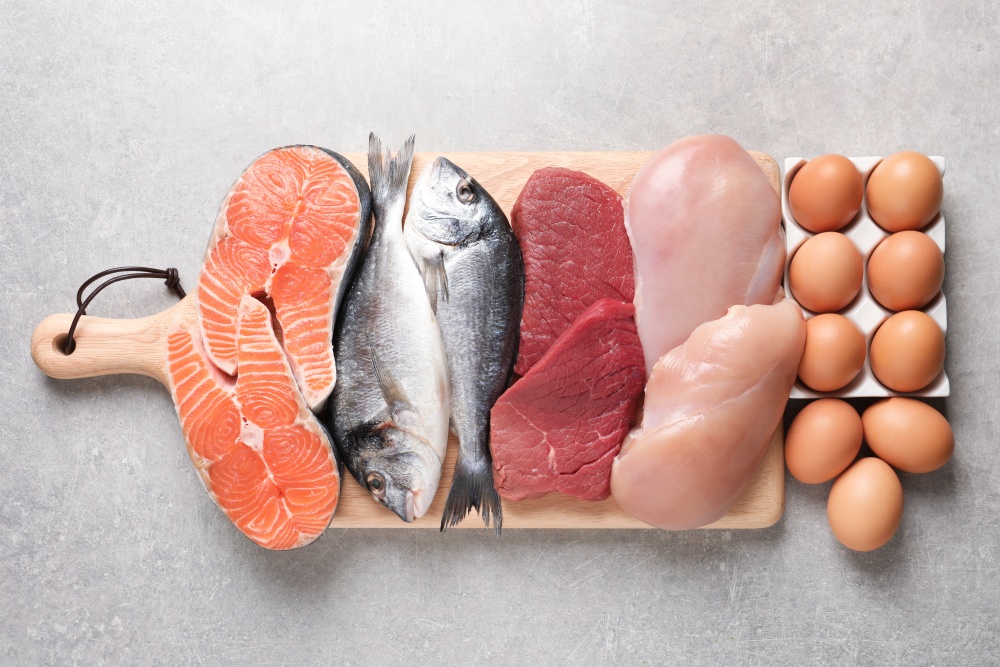Protein, often referred to as the “building blocks of life” is arguably the most critical macronutrient for brain health and repair and disease prevention as we age. One of three macronutrients found in food the body is primarily composed of protein (second only to water).
Proteins are essential for the growth, repair, and maintenance of tissues in the body (muscles and bone integrity), and they also play a role in many other bodily functions, such as enzyme production, hormone regulation, and immune system function.
All of that said, in this article, you will learn the critical role of protein in the body, the different types and implications on brain health, and how to ensure you are getting adequate protein in your diet to maintain brain health and prevent disability as you age.
Protein Metabolism
The body has a complex system for regulating the production and breakdown of proteins. This process is called protein metabolism.
Protein Catabolism
Protein catabolism is the process of breaking down the protein in food into amino acids that are then absorbed into the bloods stream.
Protein Anabolism
Protein anabolism is the processed of taking the amino acids and converting them into functional proteins.
Amino Acids
Amino acids are the building blocks of proteins. There are 20 different amino acids that the body needs to function properly, and they can be divided into two categories: essential and non-essential. Essential amino acids cannot be produced by the body and must be obtained through the diet, while non-essential amino acids can be produced by the body.
There are 9 amino acids that cannot be produced by the body and must be consumed through food. These include
- Valine
- Isoleucine
- Leucine
- Methionine
- Phenylalanine
- Tryptophan
- Threonine
- Histidine
- Lysine
What is the function of amino acids in the body?
- Tissue growth and repair
- Enzymes used for bodily functions (digestion, energy production, blood clotting, and muscle contraction)
- Act as hormones: chemical messengers that allow cells to communicate with one another
Protein Deficiency
It is important to note that if one essential amino acid is not available, protein synthesis can’t occur. With that said, protein deficiency (hypoproteinemia) has been linked to:
- Muscle loss
- Slowed growth
- Weakened immune system
- Weakened lungs and heart
What is a complete protein?
Foods that contain all of the essential amino acids are called complete proteins. These foods include:
- Beef
- Poultry
- Fish
- Eggs
- Dairy
- Soy
- Quinoa
- Buckwheat
Do amino acid supplements work?
There is little evidence that amino acid supplements are effective in protein synthesis in the body
Can you eat too much protein?
Consuming too much protein can also have negative effects on the body. Excess protein is converted into fat and stored in the body, which can lead to weight gain. It can also put a strain on the kidneys, which are responsible for filtering out waste products from the body.
Plant versus Animal Protein
Plant proteins and animal proteins differ in several ways, including their amino acid profiles, digestibility, and nutrient content. It is important to note that plant proteins do not contain all 9 essential amino acids.
Amino acid profiles
Animal proteins, such as those found in meat, eggs, and dairy products, are considered “complete” proteins because they contain all of the essential amino acids that the body needs. Plant proteins, on the other hand, are often considered “incomplete” because they may be lacking in one or more essential amino acids.
Digestibility
Animal proteins are generally more easily digested and absorbed by the body than plant proteins. This is because animal proteins are more similar in structure to human proteins, making them easier for the body to break down and use. Plant proteins, on the other hand, may contain compounds that interfere with digestion and absorption, such as phytates and fiber.
Nutrient content
Animal proteins are often higher in certain nutrients, such as vitamin B12, iron, and zinc, than plant proteins. However, plant proteins are often higher in other nutrients, such as fiber, antioxidants, and phytochemicals.
With all that said, plant-based diets require a deep understanding of how to combine plant proteins to ensure the body is getting all 9 essential amino acids to make it a complete protein. For example, beans are NOT a complete protein and must be combined with rice.
Articles you may be interested in:
Spending Time in Nature: Benefits & How to Get Started
In the digital age, people are glued to their phones at all hours of the day. Factor in sedentary lifestyles, and we are damaging our mental and physical well-being. This is why we all need to get out—we mean this in the kindest way possible. Spend time outdoors,...
Processed Foods: Balancing Convenience, Safety, and Nutrition
Today, people are eating more processed food compared to the past few decades—and it’s easy to see why. It’s conveniently available, making it an absolute time-saver in the kitchen. It’s also usually cheaper and tastier than whole, natural foods while offering a...
2023 You, Is Just Fine……
“The key to finding happiness in this life is realizing that the only way to overcome is to transcend; to find happiness in the simple pleasures, to master the art of just being.”― Brianna Wiest I bought into the hype. Yup, about two weeks ago, I started my list of...
We have “hope” all wrong……
“Hope” is a virtue that can be a good foundation to propel us forward. In fact, I think it is essential for living life in a “broken” world. Yes, the world is broken. Humans are fallible. And because of this, bad things happen to good people. Evil does not...
Ensure Indoor Air Quality With the Best Air Purifiers of 2023
Based on information from the Environmental Protection Agency, most Americans spend 90% of their time indoors. Unfortunately, the amount of pollutants inside is often up to five times higher than most outdoor areas. Though it’s a worrying statistic, air purifiers can...
Decluttering: The Life-Changing Benefits of Tidying Up
One in 11 Americans have so many belongings that they have to pay a sweet $91.14 per month (on average) for storage space outside their homes. It’s not necessarily hoarding—sometimes, they just have difficulty parting with their prized possessions because of the...
Air Purifiers: Impact on health and disease
Our “environment” is one of many ways that it is possible to “leverage” health outcomes. In other words, decrease inflammation (correlated with many diseases) and optimize cell function. “Environmental air pollution has a direct impact on human health, being...
Failure…..
“Like success, failure is many things to many people. With positive mental attitude, failure is a learning experience, a rung on the ladder, and a plateau at which to get your thoughts in order to prepare to try again.”W. Clement Stone I have met many people that have...
It’s True! Having a Sense of Agency Over One’s Health Can Increase Our Lifespan
Our resilience and it turns out—even our longevity—depends on having a sense of agency over one’s health. When we talk about a sense of agency, we’re referring to having a feeling of control over what happens to us. It’s important because it aids our mental stability,...
In Plain Sight
Ask and it will be given to you; seek and you will find, knock and the door will be opened to you Matthew 7:7 “I want my old life back”. This is not an uncommon response when I am talking with a patient about their goals. And I get it. When you feel like something is...











